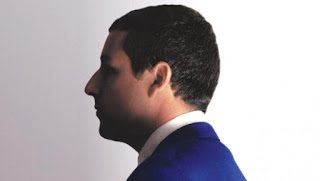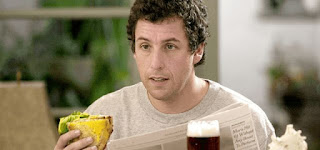The Mindful and the Mindless
The late film critic Roger Ebert once said, "I've met Adam Sandler a couple of times and he's a nice guy, smart and personable. Considering what I've written about his movies, he could also be described as forgiving and tactful. What I cannot understand is why he has devoted his career to finding new kinds of obnoxious voices and the characters to go along with them." Ebert also questioned why Sandler typically insists on playing goofy, lazy, and/or immature characters. Audiences (myself included) couldn't agree more, considering the fact that his recent movies (Jack & Jill, That's My Boy, Blended, and Pixels, among others) have been overblown, unfunny and, dare I say, resulted in poor box-office.
People have often perceived these and a majority of Sandler's films as mindless. One resource even went as far as making a list of so-called trademarks in his films, which include the aforementioned "obnoxious voices," crude sexual and/or offensive gags, shameless product placement, cameo appearances from various celebrities, and forced sentimentality. Some have wondered what message (if any) Sandler has been trying to send, or if he's just trying to be funny by any means necessary?
Simple Minds (with Complexity)
Sandler certainly has an admirable and likable personality in real life, and it's easy to see why many people like him. I may agree with a friend of mine in saying that he's best when he's serious. Make no mistake, there are moments from his old movies that are classics (Billy Madison or Happy Gilmore, anybody?), and there is a distinction in his characters, even though they are essentially one-dimensional. But it's when he does things for performance and not for cash-cow purposes that he really stands out.
 |
| Barry Egan in Punch-Drunk Love |
Ironically, many people (some die-hard Sandler fans) have said they were confused and disappointed by this one. Hence, this kind of movie, upon first-viewing, could be seen as "mindless" or trippy. But if one looks passed the Kubrick-esque and loopy elements and looks deep at the themes and ideas director Paul Thomas Anderson explores and illustrates, we find a story about a lonely man who finds and learns about love and companionship. In that regard, along with the fact that Sandler's character develops and matures (if only to a degree), we can find somewhat of a "mindful" performance.
 |
| Robbie Hart in The Wedding Singer |
One may ask, though: Did this indicate a potentially new direction in Sandler's career, similar to what The Truman Show did for Jim Carrey? Or, like Anderson's film, was it just an experiment? Other directors who've followed suit have included James L. Brooks (As Good As It Gets), Mike Binder (The Upside of Anger), Judd Apatow (Knocked Up), and Jason Reitman (Juno).
 |
| John Clasky in Spanglish |
 |
| Charlie Fineman in Reign Over Me |
 |
| Don Truby in Men, Women and Children |
"Who knows how long it'll last?"
The slogan for the 2011 movie Young Adult (which Reitman also directed) reads, "Everybody gets older. Not everybody grows up." Likewise, is it appropriate to say that Adam Sandler has grown up? Or is he being pretentious and still marveling in manchild-like antics? (Some of these ideas are what others may possibly be thinking, and not just my own thoughts.) I can't help but wonder why he doesn't make more movies that have sincerity or depth or understanding. Some may even begin to think he simply doesn't know how anymore. Roger Ebert concluded in another of his Sandler reviews (read here), "He can't go on making those moronic comedies forever, can he? Who would have guessed he had such uncharted depths?" I, for one, believe he still does.
FUN FACT: My middle school class once voted me as "most likely to be the next Adam Sandler". I couldn't disagree more. However, out of any character Sandler has ever played, I identify with Barry Egan from Punch-Drunk Love the most.




No comments:
Post a Comment